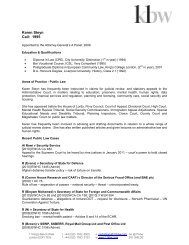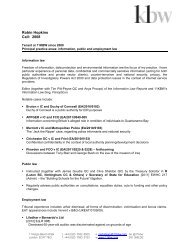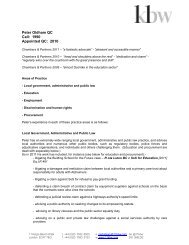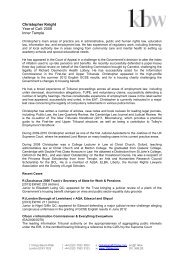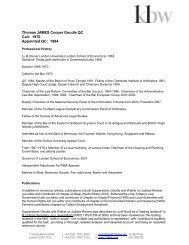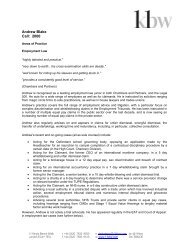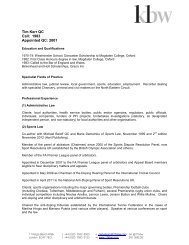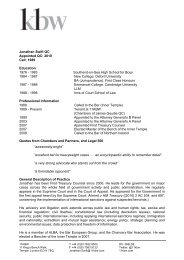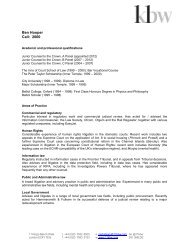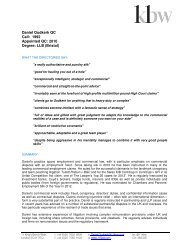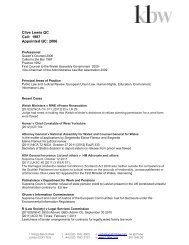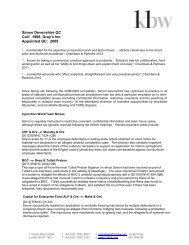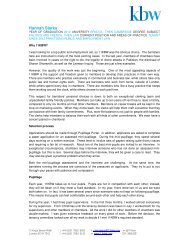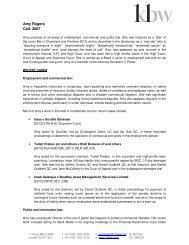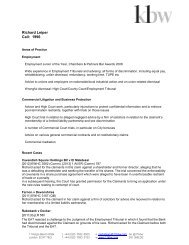THE PUBLIC SECTOR EQUALITY DUTY Joanne Clement - 11kbw
THE PUBLIC SECTOR EQUALITY DUTY Joanne Clement - 11kbw
THE PUBLIC SECTOR EQUALITY DUTY Joanne Clement - 11kbw
You also want an ePaper? Increase the reach of your titles
YUMPU automatically turns print PDFs into web optimized ePapers that Google loves.
14. At first instance (in R (Bailey) v London Borough of Brent [2011] EWHC 2572<br />
(Admin)) the Judge gave this submission short shrift. He referred to the statutory<br />
language used in section 149(1), and concluded that the PSED had to be discharged<br />
at the time at which the Council exercised its functions. The point at which the<br />
Council exercised its library functions was the point at which they took the decision to<br />
close six libraries. At paragraph 122, he stated:-<br />
“The formative stage at which the duty must be performed, in the sense<br />
meant by the guidance and decisions, is not one or all of the earlier stages<br />
when the officers or Council are contemplating and working up various<br />
options. It must be performed before the decision is made and be part of the<br />
decision-making process, rather than as a justification for the decision after it<br />
has been taken. The issue has to be addressed in the exercise of the<br />
functions, using the statutory language rather than judicial exegesis. The<br />
point at which the Council here exercised its functions under s.7 was when it<br />
decided, at the April 2011 meeting, that the LTP should proceed, including<br />
the six closures ....” <br />
15. Ouseley J held that the issue was very much bound up with the contention that the<br />
Council approached the issue of equality and closures in April 2011 with a closed<br />
mind. He concluded that there was no evidence to support that contention. The EIA<br />
was a conscientious and thorough effort to grapple with the duty in section 149, in<br />
substance and with rigour. It set out to answer the relevant questions which library<br />
closures give rise to in relation to the equality duty. He concluded that the EIA was<br />
genuinely “a core part of the decision-making process”. It could not fairly be said that<br />
the decision to close six libraries had already been taken.<br />
16. The Equality and Human Rights Commission intervened before the Court of Appeal<br />
to make written submissions on this issue. The EHRC argued that the PSED applied<br />
at each stage of a decision-making process, and could not be “put to one side”<br />
pending an ultimate decision as to the adoption of a policy. It was argued that if a<br />
policy had been closely formulated without the duty being addressed, there was a<br />
real risk that any consideration would be too late to secure effective compliance.<br />
17. The Court of Appeal unanimously agreed that the Council had exercised its functions<br />
with due regard to the requirements under section 149. However, they retreated<br />
somewhat from the Judge’s conclusion that, so long as an EIA was produced before<br />
the ultimate decision was taken, that was sufficient to discharge the duty.<br />
(1) Pill LJ stated that it was not necessary for an EIA to be conducted before<br />
the formulation of the proposals on which the public were to be consulted<br />
(paragraph 84). He accepted that the Council had had section 149<br />
properly in mind from an early stage, and for that reason had decided to<br />
<strong>Joanne</strong> <strong>Clement</strong>, 11KBW<br />
t. 020 7632 8500 e. <strong>Joanne</strong>.<strong>Clement</strong>@<strong>11kbw</strong>.com<br />
6



